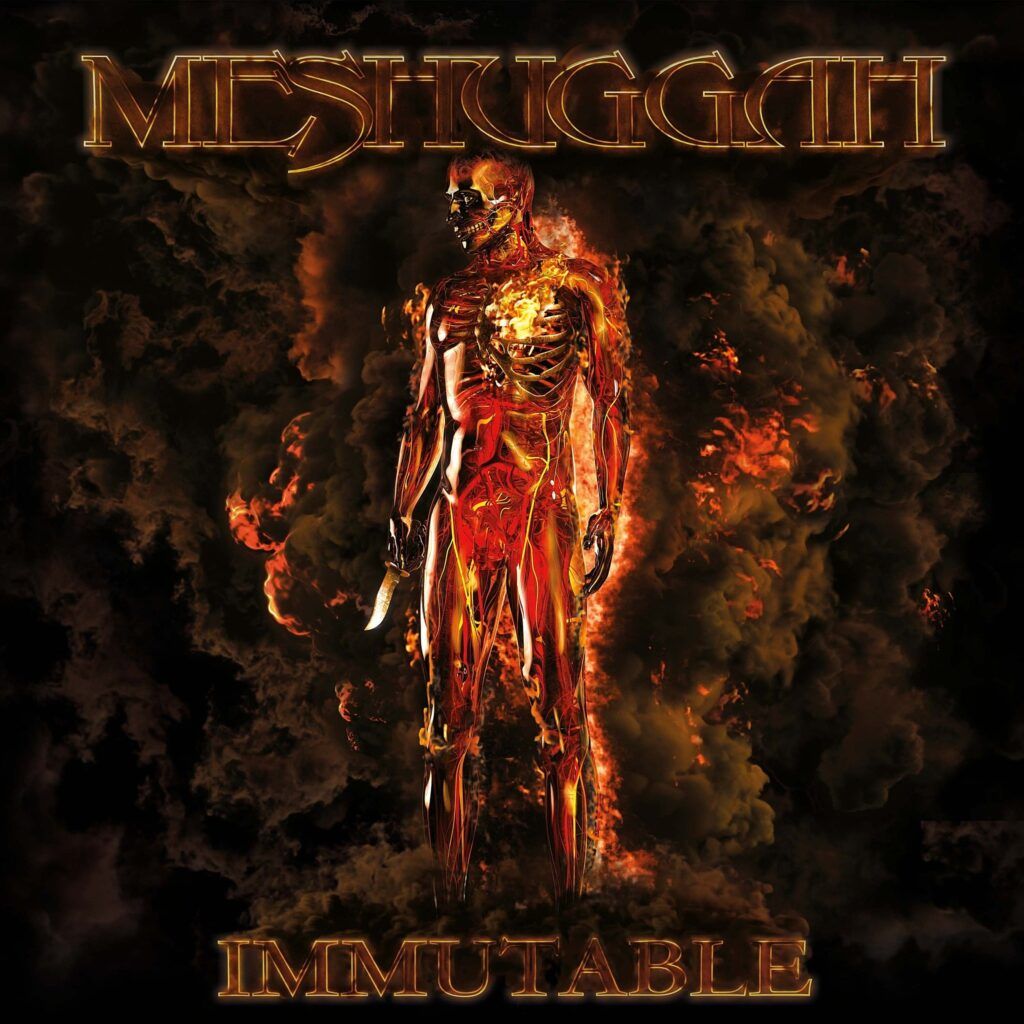
It’s hard to believe that it has been six years since Meshuggah’s last studio outing, the rapturously received The Violent Sleep Of Reason. Since that release of course, a global pandemic has sought to undermine the progress of so many bands, restricting touring opportunities and creating a massive backlog of releases, the like of which labels are set to be sifting through well into 2023. As such, Immutable is the first album of the band’s career not to be released through Nuclear Blast, the band having jumped ship to independent newcomers Atomic Fire (the label created by Markus Steiger, who founded Nuclear Blast in 1987). With the likes of Opeth, Amorphis, Agnostic Front and Sonata Arctica already on the imprint, it is a good home for the independently-minded Meshuggah and, in Immutable, they arrive on the label on the top of their game.
Opening the album, the stabbing riff of Broken Cog, instantly catapults the listener back into Meshuggah’s densely packed sonic cathedral. As airy, ethereal notes drift over the battering guitars, however, it’s clear that Meshuggah have opted for a darker, more nuanced sound on Immutable – a notion further reinforced by the whispered vocals. Heavy, yet oblique, Broken Cog makes for an engaging opening number, segueing directly into second track (and lead single) The Abysmal Eye. A more commonly Meshuggah-esque number (if the reader will forgive such a conceit), The Abysmal Eye is “simply” Meshuggah doing what they do best, the elastic groove of the cyclical riff as harsh as it is hypnotic, and it’s no surprise that this track was chosen as the opening gambit in a promotional sense. However, it is the stuttering Light The Shortening Fuse that more closely matches the promise of the opening track. Still heavy, but with a different set of dynamics, it sees Meshuggah seeking out ever evolving ways of reducing the listener to a quivering mass. next, the band allow a minute pause before unleashing the full, juddering weight of Phantoms upon the listener. Built around a relentless riff that probes the listener’s armour, looking for weak spots, it’s as brutal a piece as anything found in the band’s canon. In contrast, Ligature Marks adopts a head down groove and slowly bludgeons the listener into the ground with it. With eerie leads scarring the surface, Ligature Marks is a mechanistic terror that, despite occasional flashes of melody, is primarily interested in trepanning the listener. The band return to a more elastic style of riffing for the savage God He Sees In Mirrors, although it’s Tomas Haake’s typically remarkable performance behind the kit that really draws the attention here. However, nothing can prepare the listener for the album’s mid-point – the remarkable They Move Below. A near-ten-minute epic, this instrumental track takes the listener on a journey through territory populated with dangers both seen and unseen. It is a remarkable achievement, and it serves as the heart of this impressive outing, demonstrating not only the band’s instrumental prowess but also how much more effective they are when allowed to flex their muscles with less precision than, say, Nothing, which was almost too perfect to allow for such an emotional piece.
Given how often the adjective kaleidoscopic springs to mind when reviewing Meshuggah, it’s surprising to find that this is the first time the band have employed the name Kaleidoscope. It is an apt choice for the track, however, as it sees the dense riffs weaving around Jens Kidman’s throat-ripping vocals. More interesting is the short, hypnotic Black Cathedral, which sees the band play with a blackened atmosphere before unleashing I Am That Thirst, a powerful and dramatic track that proves strangely catchy – hardly surprising, then, that it would be the third single from the album. The descending riff of The Faultless is another track that gets under the skin and lodges there, while Armies Of The Preposterous simply explodes, a hyper-fast unloading of all the tension built up in the preceding track. The album closes with the eerie Past Tense – a rare moment of calm for the band, it provides a counterpoint to the sturm und drang found elsewhere and it brings the record to an enigmatic, reflective conclusion.
An interesting choice for an album title, Immutable refers to the unchanging properties of that being described. In one sense, this is perfectly apt – Meshuggah’s dark remit has not changed since the band’s inception. On the other hand, when taking the album itself, the band have, at least in parts, challenged themselves to offer a record of searing highs and eerie lows, demonstrating a sonic evolution from the days of the hyperclinical Nothing and Koloss. It’s not perfect. You could argue that the band play it safe on the more obvious single tracks, where a tighter focus on the more expansive pieces might have paid dividends, but it’s still one hell of a ride. Ultimately, following such a long wait, Immutable feels like a contract with the faithful, showing that Meshuggah are still here and still able to whip up a sonic storm. It is a most welcome return. 8.5/10



